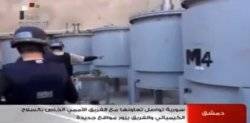Al Jazeera has obtained a leaked copy of a report by a chemical weapons watchdog that offers further evidence about the use of chemical weapons in Syria.
The report by a fact-finding mission of the Organization for the Prohibition of Chemical Weapons (OPCW), which deals with investigating the use of chemical weapons, includes eyewitness accounts of helicopters dropping barrel bombs with toxic chemicals.
Witnesses reported hearing helicopters before the attacks.
Al Jazeera's diplomatic editor James Bays, reporting from the UN, said that western members of the UN Security Council blamed the Syrian authorities for the attacks as only they had access to helicopters.
US Ambassador to the UN Samantha Power tweeted that "32 witnesses saw or heard sound of helicopters as bombs struck; 29 smelled chlorine. Only Syrian regime uses helos ."
The 117-page report offers the most detailed findings to date regarding the use of chemical weapons in Syria, but does not say which side used them.
It focuses on three Syrian villages, two in Idlib and one in Hama, where it says there is a "high degree of certainty" chlorine gas was used against the Syrian people.
The findings are consistent with two previous reports by the mission.
After a closed-door meeting of the UN Security Council on the progress in destroying Syria's chemical weapons programme, Power said the new report added credence to allegations that the Syrian government used chlorine gas as a weapon in its four-year-old civil war after pledging to give up its toxic arsenal.
The effort to eliminate Syria's chemical weapons programme was launched after a sarin gas attack on August 21, 2013 that killed hundreds of civilians in the Damascus suburb of Ghouta.
President Bashar al-Assad's government and rebel forces blamed each other for the Ghouta strike and other chemical weapons attacks, though Western government's blame Assad.
Damascus joined the OPCW, without admitting responsibility for Ghouta, after the United States threatened military intervention.
After briefing the 15-nation Security Council, UN disarmament chief Angela Kane told reporters the OPCW mission was still trying to clarify gaps in Syrian chemical weapons declaration and hoped to destroy all remaining production facilities by June.
PHOTO CAPTION
An image grab taken from Syrian television on October 19, 2013 shows an inspectors from the Organization for the Prohibition of Chemical Weapons at work at an undisclosed location in Syria.
Aljazeera


 Home
Home Discover Islam
Discover Islam Quran Recitations
Quran Recitations Lectures
Lectures
 Fatwa
Fatwa Articles
Articles Fiqh
Fiqh E-Books
E-Books Boys & Girls
Boys & Girls  Hajj Rulings
Hajj Rulings Hajj Fatwas
Hajj Fatwas














